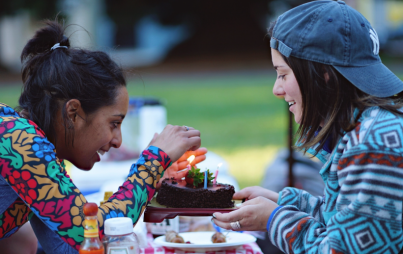
Lavish your adoration onto my friends, the rad lady and gender non-conforming folk who make up the resistance against #Gamergate. Checkout my other interviews, with Toni Rocca, Soha Kareem and Aevee Bee, by clicking on the little purple words.
It seems facetious, in the wake of my elation at getting this chance to talk with her, to introduce Leigh Alexander with a rundown of where you might have seen her work. She's an inspiration—knowing that she reads anything I've written anchors me in times of self-doubt. She's a friend—my friend.
Social justice is not a politic—it is a committed relationship of solidarity with the people you care for. There's no going home to "unwind." The outcomes of our struggles have consequences that twinge the tint of our coffee dates and late nights spent gossiping about girls in garter belts.
I want you to meet my friends, to know them—to see the amazing work they do and be, like me, motivated to conspire against the lies that kill.
Leigh has penned a plethora of amazing articles you should read (after this interview), about the decline of gamers as a consumer demographic, the common ground video games has with theater, and Eurovision. She has a wonderful Let's Play series.
Her work hurls the human element back into the fray of tech/games writing, a scene experiencing a deliberate pushback from an anti-diversity camp whose desire for a "unbiased, uncorrupt" community requires our rational absence. Logically. The capabilities of technology expand so rapidly that it can come as a challenge to really remember what it was like before we had the ability to experience nervous breakdowns from an email arriving two minutes too late. Her article on spambots from the '90s will really help you reconnect.
She was featured by Breitbart as one of the feminist bullies destroying video games, which I believe in and of itself warrants a tiara from the community. Start a collection—I'm good for about $5.
You're a columnist, a vlogger—and you even wrote a dang book! You are far and away from what I guess a layperson would imagine a "video game journalist" to be—just crunching arbitrary numbers for Sound, Gameplay, etc. How (or when) did it become clear to you that you were headed for uncharted territory? Was that always the plan?
 I think I would give myself too much credit to say I had a "plan." I started doing this maybe eight years ago, and I was conscious that my perspective was outside of the norm, but I wasn't able to really articulate it in what way (there were some cringe-inducing "HEY BOYZ, I AM A GIRL THAT'S RIGHT :D" moments, probably). But mostly I was driven by the feeling that there were other ways of thinking about games and participating in games besides the signposts we were commonly being offered, and I wrote into that gap. From there I kind of felt my way along the walls.
I think I would give myself too much credit to say I had a "plan." I started doing this maybe eight years ago, and I was conscious that my perspective was outside of the norm, but I wasn't able to really articulate it in what way (there were some cringe-inducing "HEY BOYZ, I AM A GIRL THAT'S RIGHT :D" moments, probably). But mostly I was driven by the feeling that there were other ways of thinking about games and participating in games besides the signposts we were commonly being offered, and I wrote into that gap. From there I kind of felt my way along the walls.
I had a lot of important revelations along the way thanks to women who asked for better from me and taught and reminded me how to be a better listener. It takes a while for any writer to find a voice and a purpose she can feel confident in. In that respect my journey has been incredibly ordinary. I am also conscious that I wasn't the first person to explore outside the parameters of traditional games writing. Not even close. I just was probably the loudest and elbowed my way to the front.
You wrote two books, Breathing Machine and Clipping Through; one of them is on Amazon and the other is on Gumroad. How are the two platforms different, in relation to you, the creator, and which do you prefer?
Yes, I wrote two! Breathing Machine is a memoir of growing up alongside the early Internet, which was as magical and formative a virtual space for me as any video game, probably even moreso. It was revelatory for me as a weird kid to discover this haven of weird kids, and moreover to notice that the things that made me alienated in my real life—knowing about Sailor Moon, writing elaborate corny grunge music poetry—had a place on Usenet.
Clipping Through is more specifically focused on the games industry, and what it's like to be a writer in that space. I thought some of my personal stories about people and feelings, from my perspective up close to what's actually a very complicated and easily misunderstood space, would be interesting to people. I did Breathing Machine through a publisher that offered me an advance to do the book, but I soon regretted working with that publisher thanks to some shitty articles they unapologetically published that basically contained hate speech. I thought self-publishing would let me get out from under that relationship, and I also had a hunch it would allow me to make more money and to pay other people in the process. So that's what I'm doing now—I'm going to build a digital storefront where each thing I publish is a collaboration of some kind. Liz Ryerson is an artist, musician and critic whose work I think is incredible, and she contributed some of her art and an afterword to Clipping Through. I'm able to pay her royalties every month, which makes me happy as I'm continually interested in ways writers can support one another in a sustainable ecosystem.
I am really proud of both books, but obviously I'd rather have people buy Clipping Through rather than give money to a publisher that promoted phobic language.
You're a fastidious journalist and critic, tempered with a very clear affection for what you're writing about. How do you navigate the intimacy and vulnerability of what you write?
I'm not sure, actually. I think I have to weigh the value of offering intimacy and making myself vulnerable against how important the thing I'm talking about is. I want to make sure the reader and I remain comfortable. On one hand I think that emotional honesty can be engaging for readers and can humanize a topic like games—while acting as a sort of political protest against viewing games solely as "objective tech products." At the same time, I don't intend to spill my guts just to make a point about, I dunno, some forgettable "AAA" title.
I think I feel at liberty to not be fastidious sometimes, too. I sometimes just look at something and I immediately don't like it and I tend to feel allowed to do that. I have a reputation for taking myself really seriously, but I wish people noticed the times that I, like, had a sense of humor about stuff. It makes me feel balanced.
If someone across the pond asked to trade you a piece of clothing that had a lot of sentimental value but could still be parted with for something of theirs, what would you choose?
I've kept a few T-shirts over the years. Like, I still have this FF7 launch T-shirt that I got from preordering the game at the mall in 1999. I have my black Chuck Taylors that I got when I was 13 and I still can wear them. I have a T-shirt that I used to borrow from my grandmother when I slept over at her house as a kid; she apparently got it at a party, as the employees of the Chinese restaurant I used to work at told me it said "Happy Birthday" to someone or another in Chinese. I guess I wouldn't be able to part with any of those things. If I had to trade something . . . I struggle to feel sentimental about clothes. I tend to resent them, actually, because nothing ever fits me correctly or looks good on me. Just nothing. I am more likely to be sentimental about jewelry, like, costume jewelry. I have a lot of rings that I wear on my pointer fingers.
How did you come to the decision to write books and did you find the medium or process inhibiting, given that so much of your work relies on interaction, even if only just a comments section?
I wanted to know if I could, I guess. The first time was because someone offered me money, and they said it didn't have to be long. My ebooks are not, like, standard novel length. As a writer, not knowing whether I could do a book or not was a big hanging question that I didn't like having over me. I didn't know if I could become a journalist either, but I did it by carrying on writing blog posts all the time until I knew what I was doing. Maybe if I write a lot of longer-form works, those too will be good. It's an interesting pacing challenge I don't feel that I've mastered.
Yeah, I found it tough. So much of what I'm good at revolves around using tight spaces. Most everything I write these days tops out naturally at 1,500 words; that is the rhetorical structure I'm used to using. So sometimes I'd just have to take my laptop to the pub and get drunk to get myself to keep typing, and edit it later.
This whole idea that "social justice" is ruining games journalism isn't even rationally tangible because the most compelling games writing (i.e. yours) has an inseparable human element to it which is what actually drives and compels it. Just some shop talk between pros.
I agree with you. Maybe there was a time when I would have accepted "you're the only one doing x" as a compliment, but these days I find it harder to hear, as there is just this explosive flourishing of experimental writing around games, and compassion for representation is really what drives this.
Women, queer folks and marginalized folks writing about feelings is a response to or a protest against the "dudes putting scores on things" dominant mode; the appetite for social justice has raised the bar all around. The flourishing of experimental work, especially from marginalized people, has unequivocally challenged me, educated me, and made my own work better. I think it's even had an impact on the "big guys," in that we've been loud enough that they know they have to make certain levels of compassion a priority in their writing, or else be criticized. The appetite for social justice has helped at least start a conversation about accountability and inclusion, and anyone who thinks that results in fewer options or worse writing . . . like, how could you think that and still be rational?
Tell me about a dish you've eaten that now makes you sad. Maybe it's connected to a loved one or was once a loved one itself.
Friendly's restaurants—I guess they had them in New England when I was a kid, and most of them are closed now. When I was a child my loved ones would take me to Friendly's, and I would get a black raspberry ice cream sundae. Black raspberry was my favorite because it was pale purple, and at Friendly's they'd do this clown sundae, with the cone on top being a hat, and fudge hair, and a face made out of Reese's Pieces. It was sweet and tender and kind of sad-looking and thinking of it reminds me of rare times of nurturing during a largely-troubled upbringing.
I would not eat it now as I don't tolerate lactose well as an adult and chocolate gives me a migraine sometimes and there are hardly any more Friendly's restaurants so I think that makes it extra mopey and sad.
I remember being a young girl, living in Germany, and how that subscription to GamePro Magazine felt like it and it alone was tethering me back to American culture. You live in England—do you feel a disconnect or dissonance with your American colleagues and American gamer culture? And what, if any, effect has this context had in your role as a target and critic of GamerGate?
I haven't felt disconnected. There are some differences between the gaming culture here and at home, but I can't quite put my finger on it. But so much of this is my professional environment now, and I travel so much for festivals and stuff, that my sense of gaming culture feels generally global. 
What cocktail pairs best with the following: the "Aquatic Ruin Zone of Sonic The Hedgehog 2," "Shadow of the Colossus," "Um Jammer Lammy," "King's Quest VI"?
For "Aquatic Ruin Zone," you'd want a gin and rosemary with a little lemon. Herbal and clean.
For "Shadow of the Colossus, a bourbon with a splash of ginger beer.
For "Um Jammer Lammy," I feel like you'd want one of those bright '70s drinks, like . . . a Blue Hawaii or a Scorpion Bowl. That kind of thing.
I think for "King's Quest VI" you really want a super briny Bloody Mary.
If I managed to smuggle Texas toast out of here and into England for you, would you ride a tandem bike with me? Have you ever done that? It seems one of those things idolized by people in platonic relationships—it's like the "just friends" equivalent of fucking in a bed of rose petals. Though saying "just friends" suggests that platonic intimacy isn't super important and empowering and saving lives every day.
I've never ridden a tandem bike, but I would ride one with you, if the bike is not too tall. I get very scared on tall bikes. And you're right, "just" is such a crummy thing to say about a friend.
I just heard your voice for the first time in your Lo-Fi Let's Play of "The Colonel's Bequest." You have such a charming, enrapturing timbre—I feel safe. It's strange to reflect that I've long looked up to and considered you a friend/comrade but without this intimate context of your humanity. You're a real person and what we are fighting for affects real people. I guess I don't really have a question here.
That's a very sweet thing to say. All of those games that I play on Lo-Fi Let's Plays are often my safe places, and I think I just wanted to bring that sense of safety to anyone who comes along and listens to them.
I always looked up to you, too. You seem a lot smarter and nicer and tougher than I am—
(Author's note: Lies.)
—and your pinball thing was wicked.
You can buy Leigh's book Clipping Through: One Mad Week In Video Games through digital download over at Gumroad—which is where the link points to. Just click the link. The book is really good.






